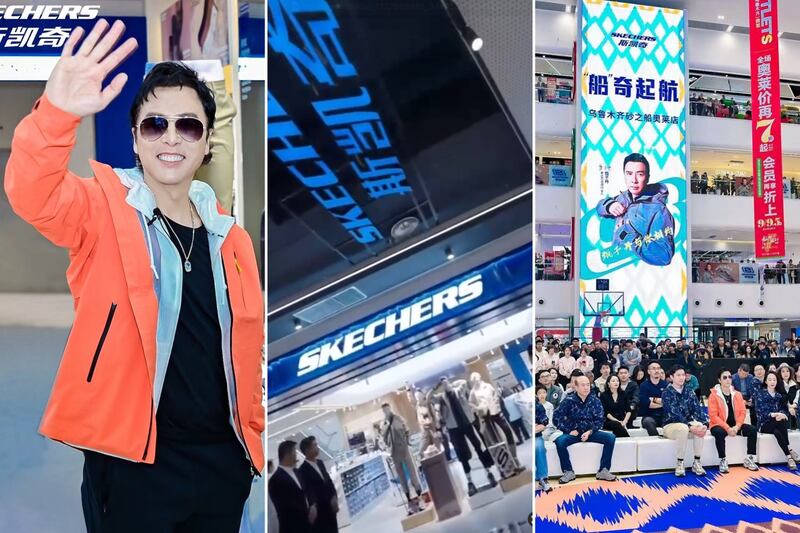Rights groups are condemning U.S. footwear and apparel company Skechers as it used the star power of martial arts actor Donnie Yen to open a new store in Xinjiang despite allegations that ethnic Uyghurs in China's far west are used for forced labor.
In a video Yen posted to Instagram, crowds inside a glitzy shopping mall in the regional capital of Urumqi clamored to catch a glimpse of the Hong Kong actor, who is a Skechers brand ambassador — and is known to have pro-China sympathies.
The company promoted its Sept. 28 Urumqi store opening heavily on Chinese social media, and Yen encouraged his nearly 130 million followers on Weibo to visit the outlet and explore its "comfortable treasures," Voice of America reported.
The brand is big in China: Of Skechers 5,200 retail stores worldwide, China has the most with more than 940.
But the big promotional event — and opening a store in Urumqi — showed that Skechers was “completely tone deaf” to concerns about the use of Uyghur forced labor in Xinjiang, said Jewher Ilham, the forced labor project coordinator at the Worker Rights Consortium.
“Skechers isn't yet taking seriously the need to extricate its business from the Uyghur region, even after it was previously linked to forced labor by U.S. Customs and other institutions,” Ilham said.
The United States has taken a strict stance on the issue. Under the 2021 Uyghur Forced Labor Prevention Act, imports from Xinjiang are banned from entering the United States unless they are certified as not made with forced labor.
In June 2022, the U.S. Department of Homeland Security added Skechers supplier Dongguan Oasis Shoes Co., Ltd., to a list of companies suspected of using Uyghur slave labor.

The Australian Strategic Policy Institute issued a 2020 report titled "Uyghurs For Sale which found that 83 global companies and brands, including Skechers, were directly or indirectly benefiting from the use of Uyghur forced labor in 27 factories in China from which they sourced products.
‘Distasteful’
Skechers has been identified as a company within that risk, said Henryk Szadziewski, research director at the Uyghur Human Rights Project in Washington.
“For me, even if the question of forced labor is in dispute, the very fact that you're opening a shop [and] profiteering in a region where there's ongoing crimes against humanity, I'd have to question the decision of Skechers here and ask them what kind of ethical guidelines and clearance were made to make this decision,” he told Radio Free Asia.
“So, it's not just the forced labor,” he said. “[In] this region are ongoing crimes against humanity, and [Skechers’] decision is to open a shop and make money. That's very distasteful.”
When RFA contacted Jennifer Clay, vice president of corporate communications at Skechers, for comment, her assistant said Clay was traveling and “too busy to deal with that right now.”
Yen, whose breakout film in the West was “Ip Man” in 2008, is a controversial figure because of his pro-China comments. He most recently appeared in “John Wick 4” in which he had a prominent role along with American actor Keanu Reeves.
His appearance at the Oscars in Hollywood in March 2023 prompted protesters to gather outside the venue, criticizing him for his lack of support for Hong Kong's 2019 pro-democracy movement, which he had called "a riot." Some critics even called on event organizers to disinvite Yen.
Many Hong Kongers have boycotted Yen's movies over his pro-Beijing stance during the 2019 protests against the erosion of Hong Kong's promised freedoms and judicial independence that saw pitched battles between protesters armed with bricks, Molotov cocktails and other makeshift weapons against fully equipped riot police who fired rubber bullets and tear gas.
Edited by Roseanne Gerin and Malcolm Foster.
